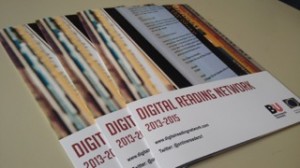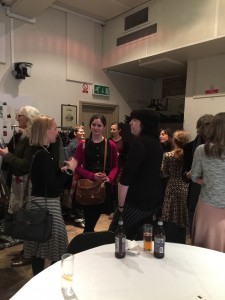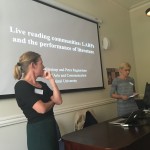Yesterday we held our final AHRC funded Digital Reading event at the Frontline Club in London, a venue with an interesting history which provided the perfect backdrop for our discussions. The event was designed to bring together fellow academics working on related projects, digital writers, publishers and representatives of reading organisations to explore digital reading from a variety of perspectives.
BU colleagues present included myself, Julia Round and Simon Frost, all from the Faculty of Media and Communication. Auguste Janutaite, a research assistant and alumni, helped with the design of our souvenir brochure and took over some of the photographic duties as the discussions got underway.


After a brief overview of the activities and research priorities of the network, we had a stimulating roundtable discussion celebrating the opportunities for creative expression that the digital has made possible, while also recognising the concerns that exist around the ownership and control of the architecture and infrastructures of digital and especially online spaces.
Among the contributions, Laura Venning of the Reading Agency predicted that the divisions between digital and non-digital reading may gradually erode, while Louise Vinter from Penguin Random House reminded us that migration between devices is by no means confined to reading, and that young readers are less concerned about distinguishing between media and platforms when it comes to talking about their enjoyment of a particular storyworld. Louise shared some exciting initiatives with us, including a Voice-controlled Roald Dahl application for Ford cars! Louise reported that while audiobooks is a major growth area, young readers still gravitate towards print even for pop cultural phenomena such as Zoella’s Girl Online.
Joanna Ellis from The Literary Platform offered some interesting reflections on ereaders, pointing out the slowing down in sales and arguing that providers had perhaps been guilty of some strategic oversights in their design and distribution of these new platforms, for example overlooking the fact that teenagers and young children tend not to have access to credit cards so can’t set up online accounts. Joanna also reflected on the dominance of the smartphone for this age group, with many of their cultural experiences being tied to one device.
The discussion continued well into the evening. It was wonderful to be able to discuss our research with colleagues from industry and the public sector as well as with writers and fellow academics. We hope that this will lead to future collaborations exploring the ongoing impact of digitisation on readers and reading.
 Reading Communities: Past and Present – AHRC conference, Senate House, London
Reading Communities: Past and Present – AHRC conference, Senate House, London










 SPROUT: From Sustainable Research to Sustainable Research Lives
SPROUT: From Sustainable Research to Sustainable Research Lives BRIAN upgrade and new look
BRIAN upgrade and new look Seeing the fruits of your labour in Bangladesh
Seeing the fruits of your labour in Bangladesh Exploring Embodied Research: Body Map Storytelling Workshop & Research Seminar
Exploring Embodied Research: Body Map Storytelling Workshop & Research Seminar Marking a Milestone: The Swash Channel Wreck Book Launch
Marking a Milestone: The Swash Channel Wreck Book Launch ECR Funding Open Call: Research Culture & Community Grant – Application Deadline Friday 12 December
ECR Funding Open Call: Research Culture & Community Grant – Application Deadline Friday 12 December MSCA Postdoctoral Fellowships 2025 Call
MSCA Postdoctoral Fellowships 2025 Call ERC Advanced Grant 2025 Webinar
ERC Advanced Grant 2025 Webinar Update on UKRO services
Update on UKRO services European research project exploring use of ‘virtual twins’ to better manage metabolic associated fatty liver disease
European research project exploring use of ‘virtual twins’ to better manage metabolic associated fatty liver disease